New Vaccine That Targets 90% of Cancers Shows Promising Results in Human Safety Trials

ImMucin, a vaccine that targets a molecule present in 90 percent of all cancers, has been tested on humans for the first time, according to researchers who found that all the blood cancer patients tested in the trial had greater immunity to the disease after receiving the drug.
Results have yet to be formally published, but if the findings are confirmed in future trials then the vaccine could be on the market in six years.
The clinical trial was conducted at the Hadassah Medical Centre in Jerusalem and consisted of ten patients with multiple myeloma, a type of blood cancer that affects plasma cells in bone marrow, have now received the vaccine.
Researchers from the drug maker Vaxil Biotheraputics and Tel Aviv University said that seven of the patients who have finished treatment all had significantly greater immunity against cancer cells compared to before they were given the vaccine, and three of the patients in the study are now free of the condition.
"ImMucin generated a robust and specific immune response in all patients which was observed after only 2-4 doses of the vaccine out of a maximum of 12 doses. In some of the patients, preliminary signs of clinical efficacy were observed," Vaxil Biotheraputics said in a statement announcing the vaccine’s promising results in its first human safety trial.
The prophylactic vaccine works by priming the body’s natural defense mechanisms to fight the disease, and aims to prevent cancer conditions, rather than attack cancer cells like many other treatments.
“ImMucin educates the patient’s immune system to identify and destroy cancer cells where the MUC1 marker is present,” the company said in a news release.
While the immune system generally attacks foreign cells like bacteria and viruses, it often fails to recognize cancer cells because tumors are formed from patients’ defective cells.
While the search for cancer vaccines has largely been hampered by concerns that healthy tissue would be destroyed along with tumors, investigators focused on the abnormally shaped MUC1 protein that is made in larger quantities in cancerous cells compared to healthy cells.
Researchers said that the vaccinated patient's immune system will attack and kill tumors when it encounters cancer cells that have significantly higher concentrations of MUC1, and while healthy human cells also contain the protein, researchers say that the level of concentration in normal cells are too low to activate the immune system after vaccination.
The therapeutic vaccine, designed to be given to patients who are already suffering from cancer, has had promising results in previous clinical trials on mice with breast tumors.
Researchers suggest that the new vaccine, made from a unique sequence that can be found in the MUC1 tumor associated antigen that is present in nine out of 10 cancers, could potentially be used to treat other conditions like breast, pancreatic, bowel and ovarian cancers.
The latest findings supported previous research published in the journal Vaccine which demonstrated that the vaccine prompted "potent" immunity in mice and increased their survival from cancer.
"There are several groups around the world investigating treatments that target MUC1, as it's a very interesting target involved in several types of cancer,” said Dr. Kat Arney, science information manager at Cancer Research UK, according to The Daily Telegraph. "These are very early results that are yet to be fully published, so there's a lot more work to be done to prove that this particular vaccine is safe and effective in cancer patients."
Published by Medicaldaily.com



























